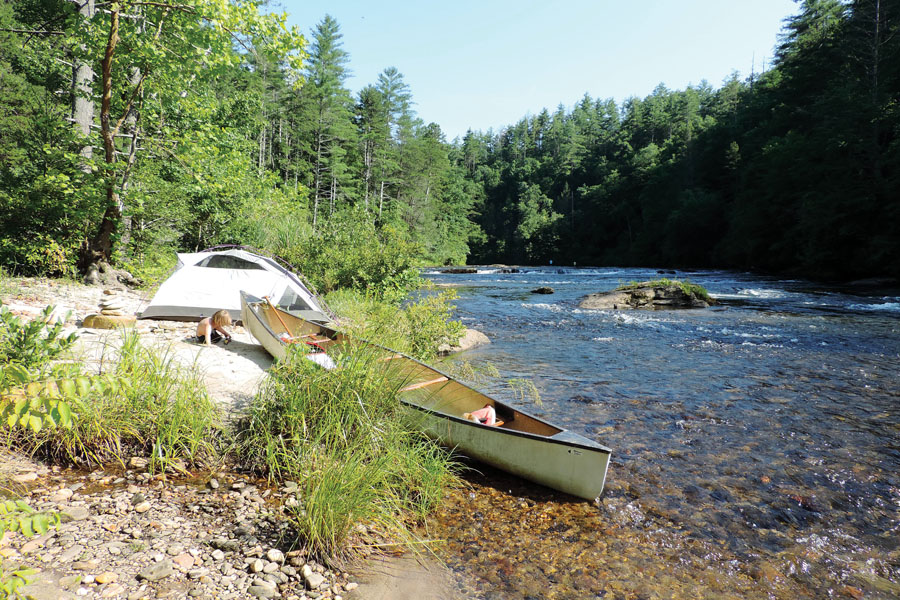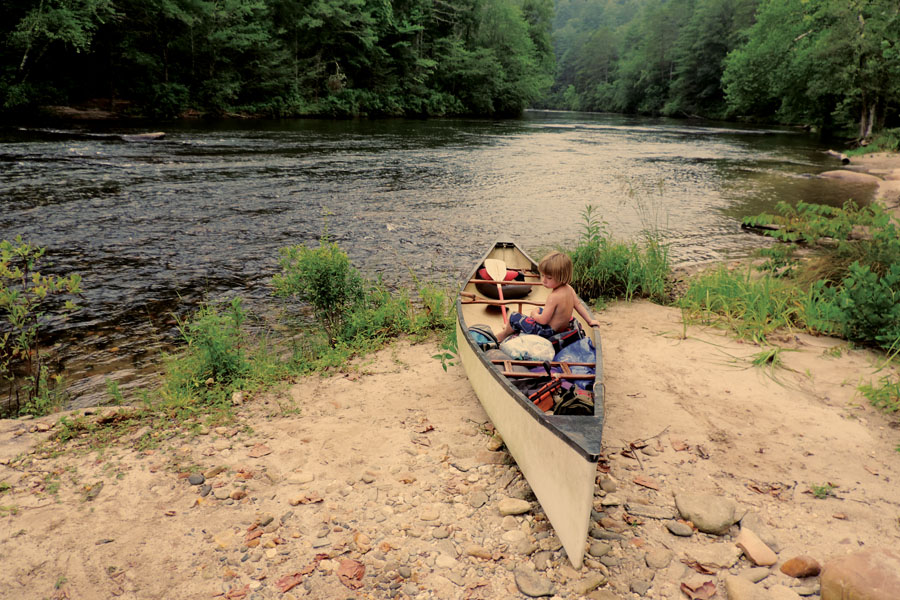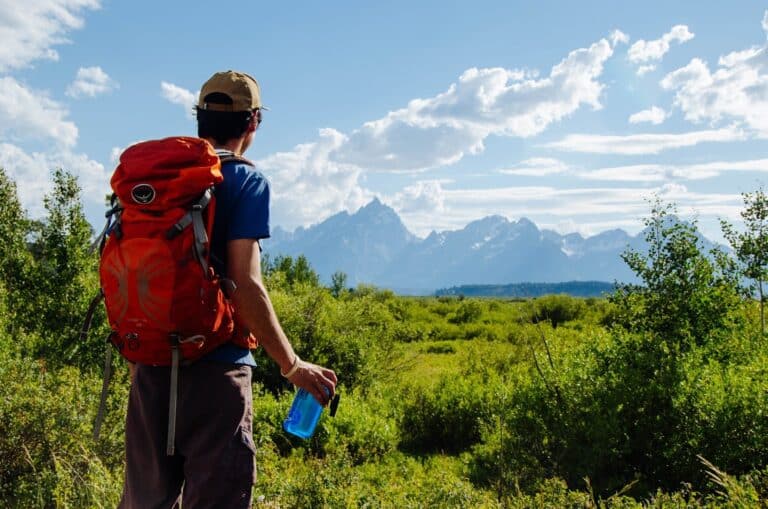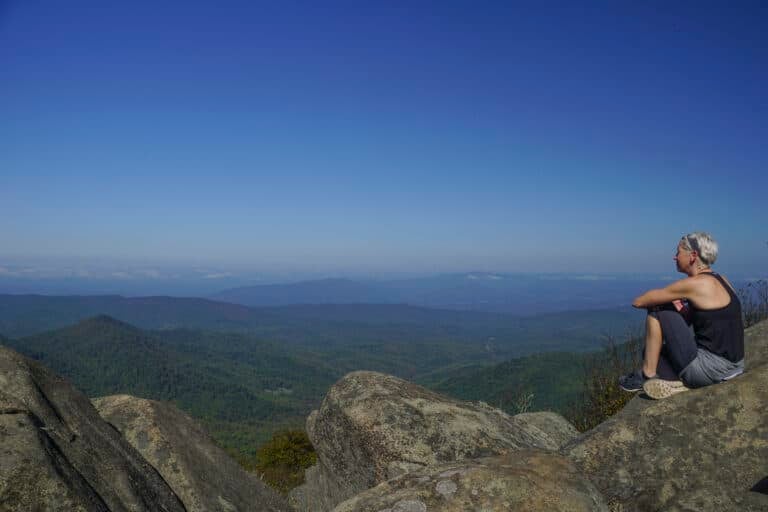I steady Tobin, my toddler, between my knees and stand up in the 18’ foot aluminum canoe to search for a chute down the rocky jumble, but still I only see the Chattooga River disappearing over the horizon line. I paddle toward my marker rock, taking one last stroke to launch us off the ramp.
“Wheee!” Tobin yells as we slide down the granite.
At the bottom of the rapid I swell with success. Tobin looks up at me wide-eyed and says, “Mama, another rabid!”
I’m brimming from the perfection of the moment, the sunlight reflecting off the water so that thousands of flecks of light dance from wave to wave. I let the canoe float in the flat pool and hug Tobin, knowing that his toddler days are passing. As a single mom, there are so many things I haven’t been able to give to my son—a dad he sees daily and a mom who isn’t stressed out living paycheck-to-paycheck. This canoe trip reminds me that I can pass along what I value most to my son, spending time on rivers.
We are on the northern border of Georgia, paddling the same river made famous by the 1970’s thriller Deliverance, which portrays the Chattooga River as a foreboding place where locals don’t welcome outsiders. In the movie, when businessmen canoe down the river, they encounter grizzled mountain men who rape one at gunpoint, ordering him to “squeal like a pig.”
As we drifted, my mind conjures images about who might live nearby, uneducated-locals-turned-meth-heads and rapists-in-the-woods—even as I told myself those are vile stereotypes that in no way reflect the real people of this region.
That evening, I beach the canoe on a sandy bank, and search for a level spot to put up our tent. On the shore, broken glass litters the remnants of a recent fire. A broken camp chair sits next to the fire ring, and a pair of men’s underwear hangs from the arm rest. The campsite looks as if it might be someone’s place, and it occurs to me that we might not be alone. A prickly fear overcomes me, and I scoop up Tobin, hurrying back to our canoe.
I paddle fast downstream in search of another campsite and finally settle on one. Tobin helps unfold the tent poles. I make an easy dinner of canned Spaghettios and the last bit of trail mix for dessert. We put on our pajamas and climb into the tent.
As soon as I zip up the tent, Tobin asks to go home. I tell him no, that we are camping for the night and will paddle out the next morning.
“I want home.”
“We aren’t going home. We’re spending the night here.’
He cries and I rock him in my arms, tears flowing down my own face as I curse my decision for taking a two-year old on an overnight river trip alone. Between his sobbing, I hear a noise.
“Shhhh. Quiet, my love,” I whisper. My thoughts turn to the rape scene in Deliverance. I think of all the wild mountain men who might be hiding out in the woods. It’s dark now, and we have no way out of here until the morning.
Tobin identifies the source of the sounds before I can.
“Frog!” he says.
Bull frogs are serenading us. We sing back, imitating the bull frog’s call, and Tobin laughs. He laughs in little peals at first and then uncontrollably until his whole body heaves from giggling. His joy is contagious, and I start laughing too.
The next morning we paddle out as sunlight pours through the pines. Blue herons sit on limbs above and startle as we approach, awkwardly loping to another perch downstream. I feel like I’ve entered into a secret dream world that exists on the Chattooga before all the tourists come out to float, before the sun casts its sharp rays directly overhead that turn the river a deep brown, before the herons disappear into the forests.
At the takeout, a father and his teenage son are casting, thigh-deep in the water when we pull up to the riverbank. I am wary as I unload Tobin and the gear. I struggle with the boat, and the teenage son wanders over to me.
“Do you need a hand?” he asks. He helps carry the canoe up the steep gravel and then hoists it on top of my car. As I start strapping it down, the boy disappears.
I tie a bowline under the front bumper and add a stern line to secure the back. Just as I’m giving the straps a final tug to confirm they’ll hold for the three-hour drive back, the son and dad reappear carrying our camping gear up from the takeout.
I am stunned by the kindness of these strangers—and my own stereotypes. All of my scary-men-in-the-woods-who-want-to-hurt-me fears fall away, leaving only embarrassment for falling victim to baseless fears. The father and son disappear down the wooded trail, and I remember the other half of the storyline in Deliverance: how locals helped outsiders who underestimated challenges posed by the river.









